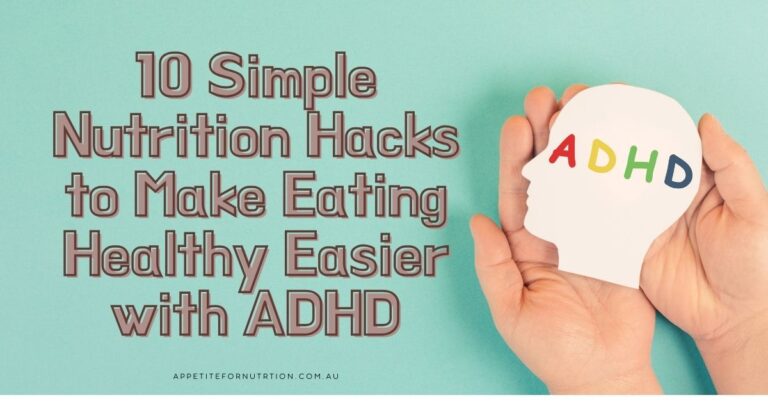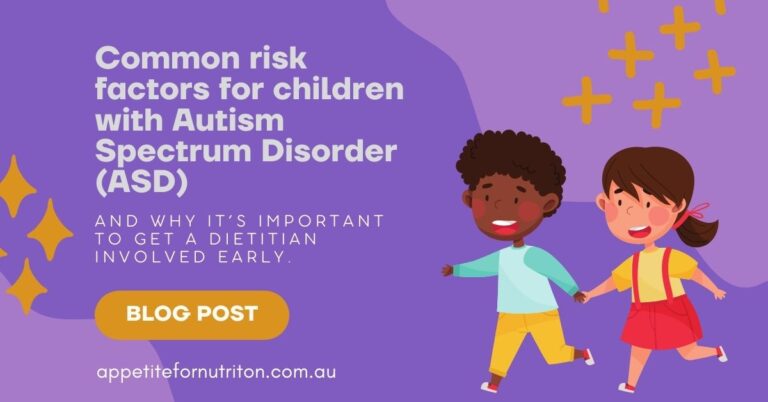
Nutrition Considerations for Autism Spectrum Disorder (ASD)
Understanding Autism Spectrum Disorder (ASD) and Nutrition
Autism Spectrum Disorder (ASD) is a developmental condition that affects communication, social interaction, and behaviour. Each person with ASD experiences the world differently — which means their nutritional needs are equally unique.
At Appetite for Nutrition, our Accredited Practising Dietitians specialise in supporting individuals with ASD through personalised, evidence-based nutrition care. Whether through the NDIS or private consultations, we focus on helping clients develop better eating habits, manage selective eating, and support overall wellbeing.
Key Characteristics of Autism Spectrum Disorder
Understanding how ASD affects daily life helps dietitians create more effective and compassionate support strategies.
Common characteristics include:
Difficulty communicating or expressing needs: Verbal and non-verbal communication challenges can make it hard to explain food preferences or discomfort.
Challenges in social interaction: Mealtimes can be stressful or confusing due to social demands or sensory overload.
Preference for routines and rituals: Predictability provides comfort, so any change in food or mealtime routines can be distressing.
Strong interests or fixations: Some individuals develop deep attachments to specific foods or brands.
Unique skills and strengths: Many people with ASD have extraordinary talents or focus, which dietitians can use to build engagement and motivation during mealtime work.
Common Feeding and Nutrition Difficulties in Autism
Feeding challenges can make meeting nutrition needs difficult — often impacting growth, energy levels, and overall wellbeing.
Common Difficulties:
Texture sensitivity: Struggles with mixed or lumpy foods, preferring smooth or crunchy textures.
Limited food acceptance: Resistance to trying new foods or sudden food refusals.
Rigid food preferences: Preference for certain colours, packaging, or temperatures.
Irregular hunger or thirst cues: Difficulty recognising when hungry or full.
Mealtime discomfort: Sensitivity to noise, light, or smells during meals.
Strict presentation needs: Food must be arranged in a specific way or served on the same plate or cup daily.
These behaviours aren’t “fussy eating” — they’re often sensory-based responses.
Working with a qualified dietitian helps families understand the root cause of these challenges and develop gentle, step-by-step strategies to improve variety and nutrition.
Read more Common risk factors for children with Autism Spectrum Disorder (ASD)
How Dietitians Support Individuals with ASD
Our ASD-specialised dietitians work closely with families, carers, and support coordinators to:
Assess nutrition intake and identify deficiencies
Develop meal plans that respect sensory preferences and routines
Support healthy weight management
Recommend supplements where appropriate
Collaborate with speech pathologists, occupational therapists, and psychologists for holistic care
Our goal is to make mealtimes less stressful and more nourishing — both physically and emotionally.
Communication Tips When Supporting Someone with ASD
When working with individuals with ASD, effective communication makes a world of difference.
Try these strategies:
Use clear, simple language — avoid complex or abstract phrasing.
Give short, specific instructions, one step at a time.
Allow extra time for processing before expecting a response.
Avoid sarcasm or idioms (these can be confusing).
Use visual aids such as pictures, meal charts, or written steps.
Be consistent — routine and predictability build trust and reduce anxiety.
Our team uses these principles in every consultation, creating a calm, supportive environment that encourages progress without pressure.
Take the Next Step Toward Better Nutrition
Every individual with ASD deserves to feel confident and nourished through food.
Our experienced NDIS dietitians help families overcome food challenges, manage gut issues, and promote long-term wellbeing — with empathy and evidence-based care.
Ready to start?
Complete an online referral today — our current wait time is less than 2 weeks, and our friendly team will guide you through onboarding.
Online and in-person appointments available across Brisbane, Gold Coast, Melbourne, Shepparton, Bendigo and Albury-Wodonga.
This blog was updated October 2025.
Frequency Asked Questions
Find quick answers to common questions
Our team of NDIS-registered dietitians helps clients make practical, evidence-based food decisions that fit their goals, lifestyle, and budget.
Dietitians assess your child’s food intake, identify nutrient gaps, and design strategies to improve variety and nutrition while respecting sensory needs and routines.
A balanced diet with adequate protein, omega-3 fatty acids, iron, and B vitamins can help stabilise energy and mood. Reducing processed foods and sugars may also help some individuals.
Yes. Dietitians use structured, stepwise exposure techniques to expand food variety safely and gradually. Small wins can lead to big progress over time.
Yes! Appetite for Nutrition provides NDIS-registered dietitian services — both online and in-home — across Brisbane, Gold Coast, Melbourne, Shepparton, Bendigo, and Albury-Wodonga.
Autism-specialised dietitians have additional training and experience in sensory eating, behavioural feeding, and communication strategies specific to ASD clients.



